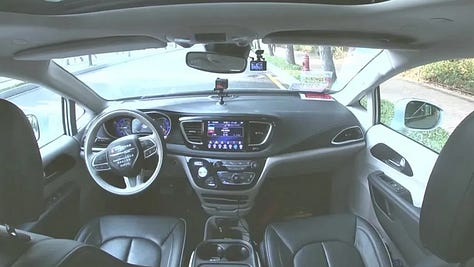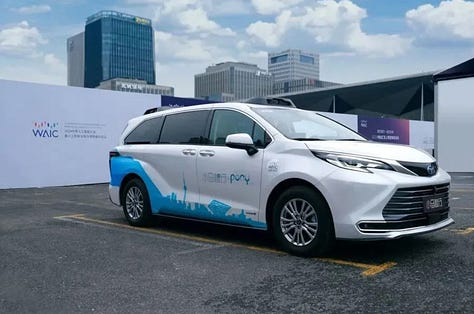Can Get a Driverless Cab in Shanghai Now
Chinese Cybersecurity Agencies Claim US Fabricated "Volt Typhoon" Hacking Group | BYD Invests $1 Billion in Turkish EV Plant, Eyes European Market
Hello from Shanghai, China. Here’s our pick for today’s news:
Can Get a Driverless Cab in Shanghai Now
Chinese Cybersecurity Agencies Claim US Fabricated "Volt Typhoon" Hacking Group
BYD Invests $1 Billion in Turkish EV Plant, Eyes European Market
1. Can Get a Driverless Cab in Shanghai Now



Shanghai has taken a bold step towards the future of transportation by issuing the first licenses for fully autonomous vehicles, marking the launch of a driverless taxi trial in the city. The licenses were granted to four companies – SAIC Intelligent Drive, Baidu Apollo, AutoX, and Pony.ai – during the 2024 World Artificial Intelligence Conference.
This development allows these companies to operate fully autonomous passenger vehicles on designated routes in the Pudong area, covering 205 kilometers. These vehicles will operate without human drivers or supervisors on board.
Shanghai residents can now experience these driverless vehicles by booking rides through dedicated mobile applications. During this demonstration phase, all rides are being offered free of charge.
In addition to autonomous taxis, driverless public buses have also been introduced. Passengers can book rides by scanning QR codes for a mini-program or using smart touchscreens. An AI-powered system processes booking requests, analyzes travel demands from nearby passengers, and calculates optimal routes based on various factors, including individual starting points, destinations, and overall traffic efficiency.
This initiative is part of a broader national trend towards autonomous driving. Currently, 51 cities across China have introduced pilot policies for self-driving vehicles. Several regions, including Shenzhen, Shanghai, Jiangsu, and Hangzhou, have established local legislation to support this technology.
Major cities such as Beijing, Shanghai, Guangzhou, Shenzhen, and Wuhan have launched open-road pilot demonstrations for driverless vehicles. For instance, Beijing is expanding its 3.0 demonstration zone to include new scenarios like the Daxing Airport, while Wuhan supports regular pilot services of nearly 500 driverless vehicles across 12 administrative districts.
However, recent incidents highlight ongoing challenges. On July 7th, a "Luobu Kuaipao" driverless taxi in Wuhan had a minor collision with a pedestrian, raising safety concerns. Citizens have reported issues such as autonomous vehicles stopping at green lights and causing traffic congestion.
As Shanghai and other cities advance autonomous driving technology, they face the complex task of ensuring safety and efficiency in unpredictable urban environments.
2. Chinese Cybersecurity Agencies Claim US Fabricated "Volt Typhoon" Hacking Group
Chinese cybersecurity agencies have released new findings challenging the authenticity of the "Volt Typhoon" hacking group, which the United States has accused of being Chinese state-sponsored. The report, issued by China's National Computer Virus Emergency Response Center and other institutions, alleges that the "Volt Typhoon" narrative is part of a disinformation campaign orchestrated by US intelligence agencies.
Key points from the report:
The "Volt Typhoon" disinformation operation reportedly began in early 2023.
It is alleged to involve multiple US agencies, including the NSA, FBI, and members of the "Five Eyes" alliance.
The campaign is described as a "cognitive domain" operation based on precision ad delivery.
Chinese researchers claim the operation aims to:
Perpetuate the "China cyber threat" narrative
Deceive US taxpayers and congressmen
Harm Chinese companies' legitimate interests
Secure the extension of FISA Section 702
The report outlines three phases of the alleged US campaign from January 2023 to April 2024.
Chinese agencies highlight what they see as inconsistencies in US claims and evidence regarding "Volt Typhoon."
The report alleges that US-backed hacker groups have conducted over 45 million cyber attacks against China in the past year.
Chinese researchers warn that Section 702 of FISA poses a threat to global sovereignty and privacy rights.
This report comes amid ongoing tensions between China and the US over cybersecurity issues, with both sides accusing each other of state-sponsored hacking activities. The Chinese agencies call for international opposition to what they describe as US abuse of its technological advantages in cyberspace.
3. BYD Invests $1 Billion in Turkish EV Plant, Eyes European Market
Chinese automotive giant BYD has signed an agreement with Turkey's Ministry of Industry and Technology to invest approximately $1 billion in a new automobile factory and research and development center in Turkey. The announcement came on July 8th amidst growing tensions between China and the European Union over electric vehicle tariffs.
The new factory is expected to produce 150,000 pure electric and hybrid vehicles annually. Production is slated to begin by the end of 2026.
Furthermore, this strategic move comes at a crucial time-the European Union has recently imposed temporary tariffs on Chinese electric vehicles. Turkey, while not an EU member, has a customs agreement with the bloc. Vehicles produced in Turkey can be exported to EU countries without additional tariffs.
The investment is likely to strengthen BYD's position in the European market. In May, a BYD Europe executive stated that the company's long-term goal for the European market is to achieve local production.
This development underscores the shifting dynamics in the global electric vehicle industry, as manufacturers seek to navigate trade tensions and capitalize on emerging markets. BYD's investment in Turkey could serve as a gateway to Europe, potentially allowing the company to circumvent EU tariffs while expanding its international presence.
China Dominates AI Innovation: 74.7% of Global GenAI Patents
China has established itself as a global leader in artificial intelligence (AI) innovation and patent filings. According to the "WIPO Patent Landscape Report on Generative AI," China-based inventors are filing the highest number of AI patents worldwide. Between 2014 and 2023, China accounted for more than 38,000 generative AI (GenAI) inventions, which is six times more than the second-place United States.
China Builds Light 1 trillion Times Brighter Than the Sun
In the bustling heart of Beijing's Huairou Science City, a marvel of human ingenuity is taking shape - the world's most radiant beacon of light is being erected. This awe-inspiring edifice, akin to a titanic X-ray machine of unparalleled scale, promises to pierce the veil of the infinitesimal realm, casting illumination upon the unseen microcosm.







Can I have links to the point number 2? Obviously from the Chinese side